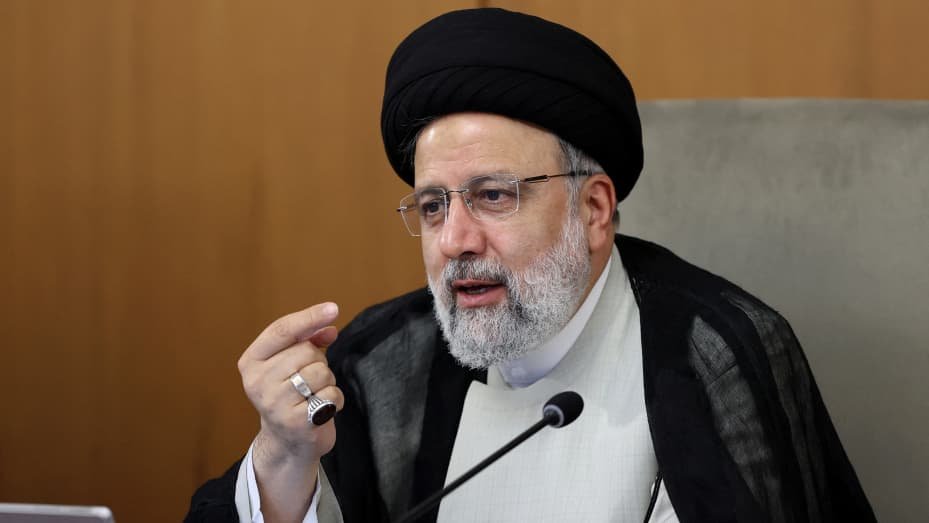Introduction
In a tragic turn of events, Iran’s President Ebrahim Raisi was killed in a helicopter crash in the East Azerbaijan province on Sunday. The incident, which also claimed the life of Iran’s Foreign Minister Hossein Amir-Abdollahian, has sent shockwaves through the nation and the world, particularly amidst heightened regional tensions.

The Crash and Immediate Aftermath
The helicopter carrying President Raisi and his entourage disappeared over a mountainous region in northwest Iran. Iranian state television reported that upon locating the helicopter, there were “no signs” of life among the passengers. The exact cause of the crash remains under investigation, with initial reports from state media referring to it as an accident. However, an official statement from the Iranian government is await, and any indication of foul play could further escalate regional tensions.
Heightened Regional Tensions
The death of President Raisi comes at a critical juncture for the West Asia region. The ongoing conflict in Gaza and Iran’s recent escalations with Israel have already strained the geopolitical landscape. For the past seven months, Israel has been engage in a war in Gaza, triggered by a Hamas attack on Israeli cities. Iran has been accuse of backing Hezbollah’s efforts to open a front against Tel Aviv from Lebanon.
A significant escalation occur last month when Iran launch missiles at Israel, most of which were intercept by Israel’s Iron Dome defense system. This attack was in retaliation for the bombing of Iran’s embassy in Syria, allegedly by Israeli warplanes. Israel responded with a limited attack on a missile defense system in Iran’s Isfahan province, which also houses a uranium enrichment plant.
Deeply saddened and shocked by the tragic demise of Dr. Seyed Ebrahim Raisi, President of the Islamic Republic of Iran. His contribution to strengthening India-Iran bilateral relationship will always be remembered. My heartfelt condolences to his family and the people of Iran.…
— Narendra Modi (@narendramodi) May 20, 2024
Implications for Iran and the Region
The Iran President’s death is bound to spark a wave of speculation and has significant implications for Iran and its foreign relations. Although state media have termed the crash an accident, any evidence of sabotage could inflame already volatile relations with Israel and other regional actors. Supreme Leader Ayatollah Ali Khamenei is expect to maintain a steady hand over Iran’s governance, ensuring continuity despite the loss of Raisi.
The US, a staunch ally of Israel, has not yet officially responded to the news of Raisi’s death. However, President Joe Biden has been brief on the situation. The past few years have seen deteriorating US-Iran relations, particularly after the US withdrawal from the Joint Comprehensive Plan of Action (JCPOA) in 2018 under then-President Donald Trump. The re-imposition of harsh sanctions on Tehran led Iran to progressively violate the agreement’s nuclear limits.
President Raisi, who took office in 2021, adopted a tough stance in negotiations, seeking significant relief from US sanctions in return for modest curbs on Iran’s advancing nuclear technology. His death adds uncertainty to the already tenuous efforts at diplomatic engagement between the two nations.
Domestic and International Reactions
Prime Minister Narendra Modi of India expressed his condolences, stating he was “deeply saddened and shocked by the tragic demise of Dr. Seyed Ebrahim Raisi.” Modi highlighted Raisi’s contributions to strengthening India-Iran relations, particularly in the context of the recently signed contract to operate the Chabahar port. This agreement aims to expand trade with Central Asia and had drawn a sharp response from the US, warning of potential sanctions.
Domestically, Raisi’s death comes at a time of significant internal challenges. The nation has been grappling with a severe economic crisis, exacerbated by international sanctions and internal unrest. Raisi’s tenure was marked by a crackdown on protests and stringent enforcement of conservative social policies. He had ordered tighter enforcement of the “hijab and chastity law,” leading to widespread protests after the death of Mahsa Amini in police custody in 2022.
Raisi’s Legacy
After Iran President’s death Ebrahim Raisi’s political career was a blend of staunch conservatism and ruthless enforcement of theocratic principles. Rising from the ranks of Iran’s judiciary, his name became synonymous with the mass executions of political prisoners in 1988, earning him the moniker “The Butcher of Tehran.” Despite his controversial past. Raisi was seen as a potential successor to Supreme Leader Khamenei, holding significant influence within Iran’s power structures.
Under his presidency, Raisi sought to reinforce Iran’s revolutionary ideals, often taking a defiant stance against the West, particularly the US and Israel. His administration was characterize by a hardline approach to both domestic governance and international diplomacy. Raisi’s support for Palestine and his vocal opposition to Israel were cornerstones of his foreign policy, reflecting the ideological legacy of the 1979 Islamic Revolution.
Also Read: Kyrgyzstan vs India: Rising Tensions and Safety for Students
The Path Forward
In the wake of Iran President’s death, the immediate focus will be on stabilizing the country and managing the succession process. Ayatollah Khamenei’s continue leadership is expect to provide a semblance of stability, but the loss of a prominent figure like Raisi could lead to internal power struggles and shifts in Iran’s political landscape.
Internationally, the response to Raisi’s death will be closely watch. The US and its allies, particularly Israel, will be keenly observing any changes in Iran’s foreign policy stance. The ongoing conflict in Gaza, Iran’s support for Hezbollah, and the broader West Asia dynamics are likely to be influence by the developments in Tehran.
For the Iranian populace, Raisi’s death adds to a sense of uncertainty and turbulence. The nation is still recovering from the economic hardships and social unrest that have marked recent years. The leadership transition will need to address these internal issues while navigating the complex web of international relations.
In conclusion, the death of President Ebrahim Raisi is a significant event with far-reaching implications. It not only affects Iran’s internal politics but also has the potential to alter the geopolitical landscape of West Asia. As the world watches closely, the aftermath of this incident will reveal much about the future direction of Iran and its role in regional and global affairs.







